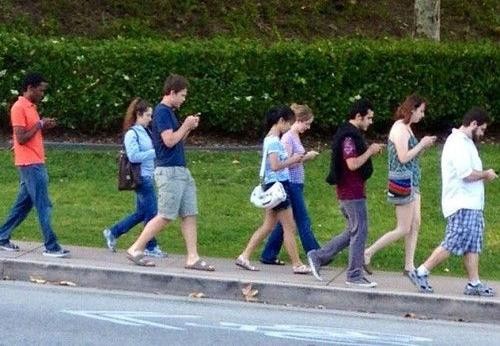BEWARE: THE WALKING DEAD ARE AMONG US

By Bob Vickrey
The Walking Dead is no longer just television fiction. The real life version that walks among us every day is far more frightening.
As I took a stroll along the sidewalks of my neighborhood recently, I skillfully dodged an oncoming daredevil skateboarder, but realized that a greater imminent danger lay just ahead. Several weaving pedestrians approached me as they stared down at their phones while texting a message.
This familiar scene now plays out daily all over this country, as everyone seems to be impersonating those stumbling zombie characters from the television show. Whether they are walking or driving, these menacing figures seem eerily hypnotized by incoming messages received on their cell phones—which they hold in a virtual death-grip.
Although these aliens appear to be harmless, when separated from their life-support apparatus, the situation can quickly turn ugly. Bystanders generally know to stay out of harm’s way and not interrupt their inexorable fixation with the screens that have them held absolutely rapt and spellbound. Their faces appear to convey the message that disconnection could prove harmful to parties in nearby proximity.
I stepped off the sidewalk and quickly ducked into the closest alley to escape the impending head-on confrontation, then breathed a sigh of relief as the zombie parade continued up the street.
The world of technology has connected us electronically like never before, but ironically has resulted in our disconnection from those who are actually in our very presence. Face-to-face human contact appears to have lost its appeal as our society has become more comfortable in putting considerable distance between our connections.
I recently encountered a potential New Yorker cartoon scenario as I walked into a local coffee shop and observed a middle-aged couple sitting across the table from one another—each silently staring at the phones in their laps. I imagined a caption reading: “When the magic is gone.”
Considering the millions of Americans that have fallen victim to mass addiction of cell phone dependence, I began to anticipate the impending cultural changes we could expect in coming years.
The obsession of constant remote contact with the outside world could become so dire that speech patterns, as we know them, could become obsolete. We could soon begin to mumble “GTG, TTYL” to our own family members. (Translation for the text-challenged: “Got to go, Talk to you later”) High schools will begin issuing ten-page textbooks—all written in shorthand “text-speak.”
Our friends who have fallen in love with their phones will legally change their names to “Nokia” and “Samsung.” The national marriage rate will begin to plunge. Verizon will offer an “Eternity” plan, which will allow the user unlimited texting until their ultimate demise, and then surviving family members will inherit the bill.
New 12-step programs will begin to pop up across the country to address the addictive behavior of the average American citizen. The meetings will open with the traditional: “Hi, my name is Bob… and I’m a text-a-holic.” Rehab centers will be flooded with texts, beginning with the message: “c u 2moro.”
We can expect “interventions” to become commonplace, as friends and family members plead with loved ones to hand over their phones and simply come downstairs for dinner. Drug companies will market “body-patches” which can be worn in helping reverse patterns of incessant text chatter. Instead, the patch will end up curing their smoking habit, while creating an unintended side-effect that will only enhance their texting speed.
Congress could be forced to eventually enact legislation which would make texting illegal in all states—with the usual exception of Arizona.
However, commonsense will eventually prevail, and communities will form coalitions encouraging citizens to relinquish their cell phones to authorities so that order can once again be restored in our society. Carefully orchestrated community cell phone bonfires will create flames visible as far away as Cleveland.
Neighbors will finally meet each other, shake hands, and look one another directly in the eye for the very first time. Unfortunately, the initial shock of this face-to-face encounter will ultimately prove so daunting that each party will likely have absolutely nothing to say to the other. However, the occasion could prove to be a meaningful first step in the right direction.
Bob Vickrey is a writer whose columns appear in several Southwestern newspapers including the Houston Chronicle. He is a member of the Board of Contributors for the Waco Tribune-Herald and a contributor to the Boryanabooks website. He lives in Pacific Palisades, California.
Comments
Leave a Reply
You must be logged in to post a comment.



